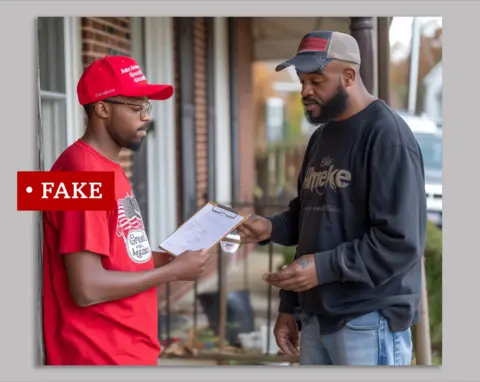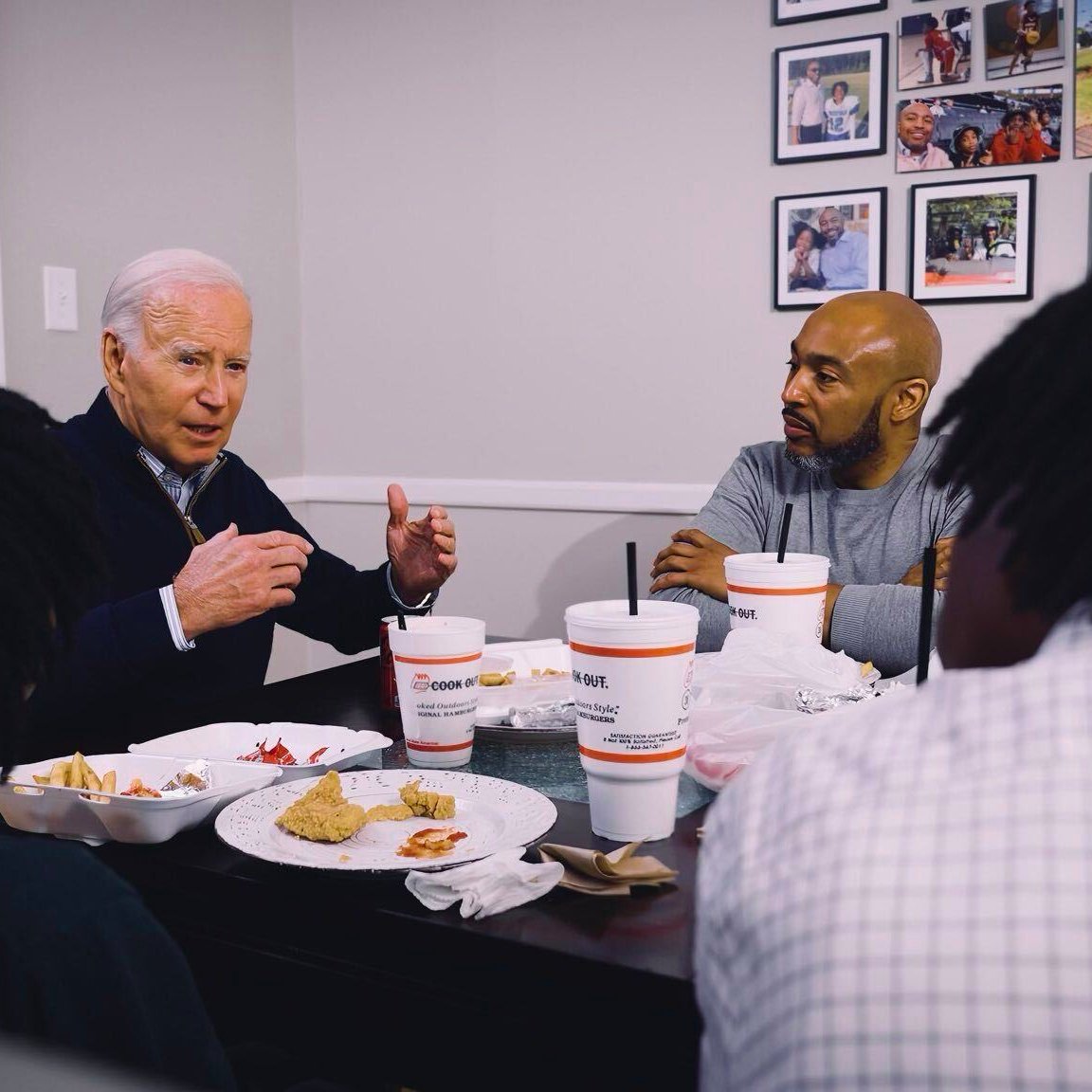You are using an out of date browser. It may not display this or other websites correctly.
You should upgrade or use an alternative browser.
You should upgrade or use an alternative browser.
Trump supporters target black voters with faked AI images
- Thread starter bnew
- Start date
More options
Who Replied?daiquiridream
Pro
So how would these same supporters feel if he chose Ben Carson as his VP?
They'd love Carson because he will kiss Trumps assSo how would these same supporters feel if he chose Ben Carson as his VP?
OperationNumbNutts
Superstar
I see this as a test run.
Peter Popoff
PROTECT YA NECK!! ❤️🖤💚 🙏🏽
Them shıts real, Trump got big hands dawgYou telling me these images are fake? I don't believe you.


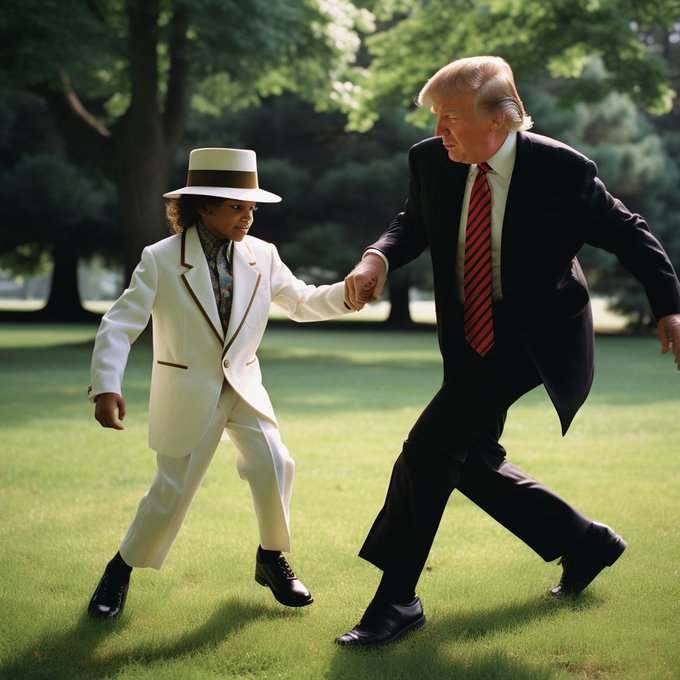
Vandelay
Life is absurd. Lean into it.
We're about to enter a dangerous time period.
NYChase718
Veteran
Yaboysix
That nikka
Why not just use REAL photos of Trump and Black people...all these grifters online, and they can round them up for a picture?
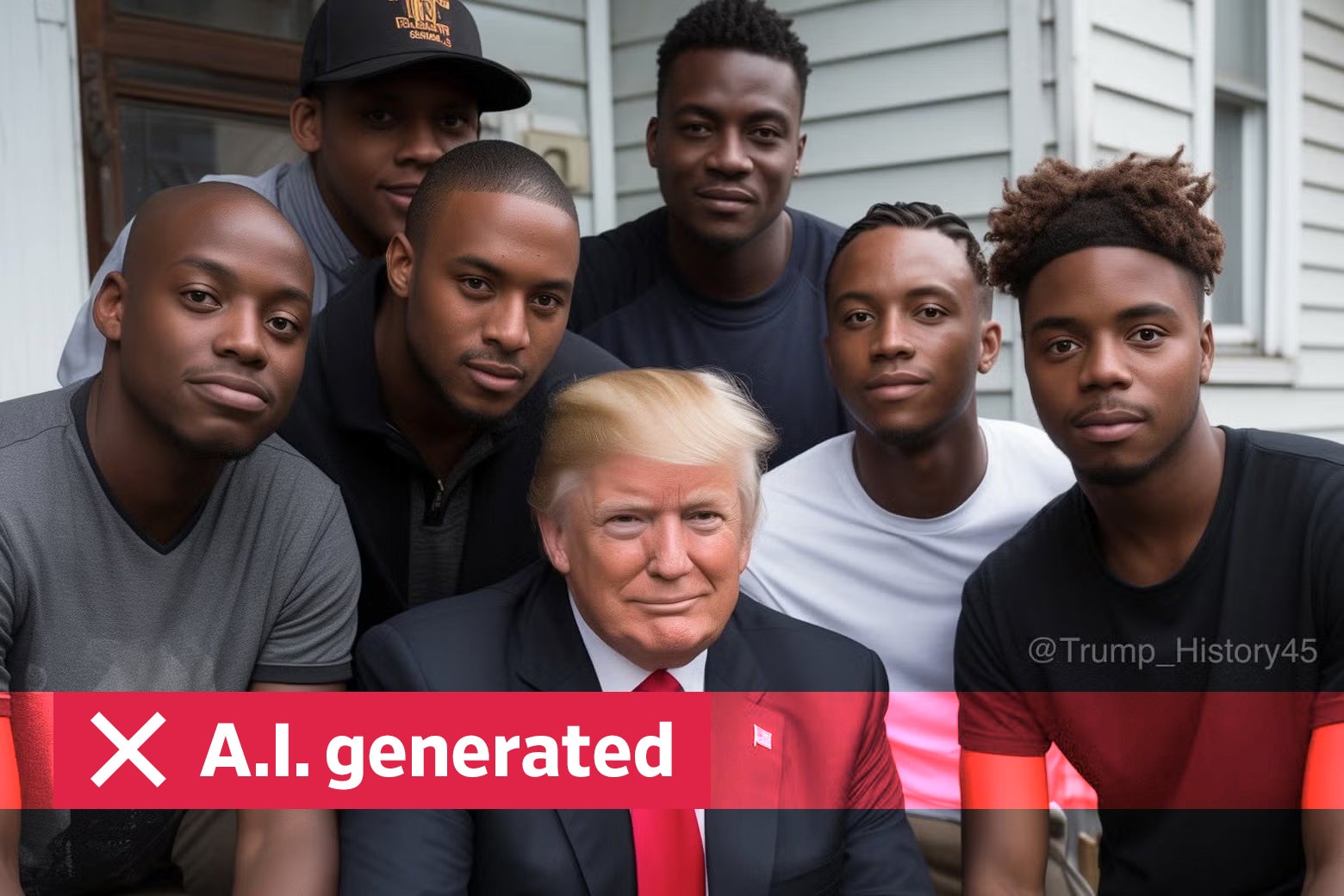
So, Fake Images of Trump With Black Voters Are a Thing Now
And this is just the beginning.
So, Fake Images of Trump With Black Voters Are a Thing Now
And this is just the beginning.
BY NITISH PAHWAAPRIL 10, 202410:00 AM
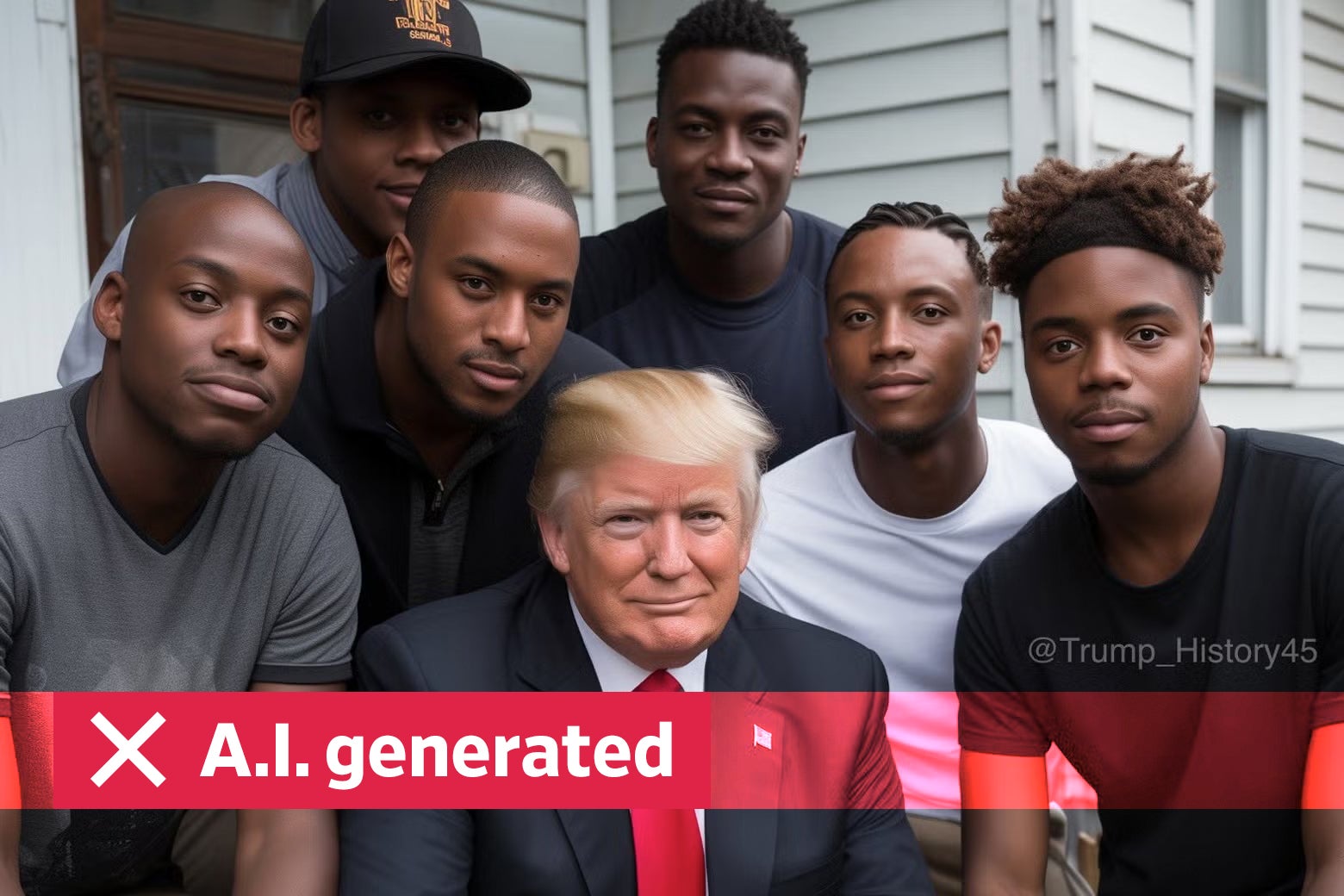
Photo illustration by Slate. A.I.-generated photo from @Trump_History45/Twitter.
Recently, Donald Trump fans in Florida and Michigan have been auto-generating and spreading around faked “pictures” of Trump surrounded by crowds of Black supporters—and earning significant traction for doing so. Coming at a time when President Joe Biden is worried about losing the Black voters who came out for his 2020 election, the Trump images have become a whole new subgenre of A.I. sludge. And no one in any position of power appears to know what to do about it.
Last month, BBC Panorama reported on the proliferation of these deceitful likenesses. The first example displayed Trump at a Christmas party with his arm around a couple of Black women, one of whom is seen wearing a Pen & Pixel–style tank; another shows him sitting on a house porch with six young Black men, smiling with his hands clasped. Both images gained substantial traction on Facebook, sans disclosure that they were A.I.-generated, and were misleadingly appended as context for stories on Trump’s increasing appeal to Black voters.
These fakes, made with popular artificial intelligence tools, have become more and more common. Last August, shortly after Elon Musk revoked Twitter’s ban of Dom Lucre—a far-right conspiracist and peddler of child sexual abuse imagery—the fringe influencer shared a hazy “photo” of Trump at a Black-hosted cookout and asked, “ Why is Obama never in the hood?” Even for the misinformation-choked social platform, this was a bit much, and the image earned a Community Note pointing out that it was A.I.-generated.
But other such shares did not earn the same scrutiny. The Center for Countering Digital Hate, which recently beat back a meritless lawsuit from Musk, found in a report released last month that the cookout image was first crafted and posted by @Trump_History45, a parody account that specializes in prompting up deepfakes of Trump with various historical figures (including but not limited to Martin Luther King Jr., the Notorious B.I.G., Bob Marley, and Nelson Mandela). There was no Community Note attached to the account’s original post.
The account’s clear historical forgeries are somewhat obvious. The more generic outputs from @Trump_History45’s prompts tend to situate Trump with Black Americans in stereotype-saturated images (e.g., racist tropes around watermelons) alongside faint watermarks and erroneous timestamps—fine enough to fool your average Facebook-addicted boomer without context. One from late August purports to show Trump flashing a thumbs-up with “ supporters outside of the Fulton County Jail,” all of whom are Black and a couple of whom are wearing colorful kufis. (It should go without saying that there are no such photos of Trump with supporters outside the jailhouse.)
Others purport to show Trump “ serving breakfast at the local Waffle House,” “ riding through the streets of Compton” on bicycles, and “ reading to local schoolchildren.” Whatever the typical parody-account disclosures, such images are clearly meant to be spread far and wide to demonstrate that “ Joe Biden would NEVER take a picture” sitting so comfortably with Black supporters. Indeed, after the BBC report spotlighted the Trump porch photo that had originated from “Trump History” in late 2023, the account admin sarcastically asked why the media attempts “ to discredit photographs of Donald Trump hanging out with his supporters.”
Donald Trump often takes time out of his day to read to local schoolchildren. The media often fails to mention this. pic.twitter.com/0aBbz6ztCR
— Trump History (@Trump_History45) August 23, 2023
The point, after all, is not just in creating such images, but in doing so and washing your hands of anything that happens with them afterward. The Florida radio host who’d made the Trump Christmas party image had “posted an article about black voters supporting Mr. Trump and attached this image to it,” according to the BBC, but the creator insisted that he was “not claiming it is accurate.” The portrait of Trump on the porch similarly gained further attention “when it was reposted with a new caption falsely claiming that he had stopped his motorcade to meet these people,” per the broadcaster. When such auto-generated uncanny valleys shoot out into the ether, it becomes all the easier for other troublemakers to spread them to more gullible audiences—and it becomes impossible to nail down just who was behind them, frighteningly easy as they are to generate.
Since these creations earned press attention, tech platforms appear to have taken varying steps to address the underlying issue. The first Facebook post with the Christmas party image is now “hidden behind a warning that it had been flagged as ‘false information’ by independent fact-checkers,” per the Washington Post. Midjourney, the popular A.I. image-generation tool behind the BBC-highlighted Trumpfakes, “ started blocking its users from creating fake images” of Biden and Trump by mid-March, according to the Associated Press. Other A.I. generators from OpenAI and Microsoft are similarly implementing restrictions on providing election- or candidate-specific outputs, while Meta has promised to start adding A.I. disclosure labels to realistic-looking images, videos, and audio clips by next month (even though company executives don’t appear to believe any of this is a big deal).
POPULAR IN
- Greg Abbott’s Cruel Moves on Immigration Were, Unfortunately, Genius
- Epidemic of Bozo Behavior Strikes Republican Senate Candidates Who Were Supposed to Be Boring
- The Kid Behind America’s Most Bizarre Conspiracy Theory Just Found the Perfect Second Act
- So, Fake Images of Trump With Black Voters Are a Thing Now
With the Federal Election Commission delaying regulations on election-related A.I. information until … after the fall’s election, states like Oregon, Wisconsin, New Mexico, Utah, and Indiana have passed their laws with restrictions or requirements for public disclosure imposed on A.I. impersonations of candidates. However, the scope of these relatively new laws varies quite significantly, and we have yet to see how effective they will actually be. The Trumpfakes described here wouldn’t require any A.I. disclaimers in Wisconsin, whose law only covers campaign-produced deepfakes. An Arizona bill awaiting further statehouse action would, like New Mexico’s enacted law, impose criminal penalties for A.I.-generating candidate impersonations for electoral purposes—but only if they were manufactured in the three months leading up to Election Day. And mechanisms for final enforcement similarly vary: New Mexico will split deepfake-oversight duties between its Ethics Commission and its secretary of state’s office, while Oregon’s gubernatorial administration is still hashing out enforcement measures.
There will surely be other apps and other means by which users will continue to spit out false imagery of real people, including politicians. And there will be further chaos and uncertainty as officials at both the local and federal level scramble to address all of this. The grim news is, it’s unlikely the U.S. will figure out a uniform standard by the time Election Day rolls around, making the 2024 cycle a real-time experiment for preserving democratic processes in an A.I.-saturated world. If cartoonish deepfakes of Trump with made-up Black people can fool the average social media–informed voter, well, we’re clearly unprepared for the even savvier forgeries to come.

